by Venchito Tampon Jr | Last Updated on July 17, 2023
What is SEO Outreach?
SEO Outreach is the process of reaching out to content publishers and asking them to link to your content to improve your page’s visibility and rankings on search engine results pages (SERPs). Done with the intent to benefit both parties mutually, SEO outreach becomes a strong source of relationships and partnerships for the outreach specialist reaching out to potential link targets.
While anyone can send email pitches to any content publisher they’re eyeing, starting by identifying objectives for your SEO outreach campaign is much easier, more efficient, and more effective.
SEO Outreach Objectives
An effective SEO outreach campaign starts by having the right objective. Without a goal in mind, your SEO outreach will feel pointless, leading to zero to average results in link placement.
The key is to identify what specific goals you want for each of your SEO outreach campaigns.
Here are some critical key factors to consider as your main objectives for a link acquisition campaign.
Topical Authority
Topical authority refers to the credibility of your website about a given topic theme. By publishing more informative and comprehensive blog content about a niche topic, search engines, and search users see you as a subject matter expert.
This helps you to easily rank for informational and landing pages, as Google trusts you as a topical authority within the niche.
When sending SEO outreach emails, you think of establishing your topical authority. You suggest specialized topics when guest posting to build topical expertise on external websites. This sends off-site signals to Google that you’re a go-to personality in your niche through topically relevant content, author info, and other pertinent E-E-A-T factors.
Rankings
One of the main objectives of SEO outreach is to improve your website’s online rankings by accumulating backlinks to your target pages. By sending valuable outreach emails, you can get a backlink that passes link authority and equity to its destination (your target page).
And through these links acquired, you increase the likelihood of your target page (informational or money page) dominating the top spot in search engine results pages (SERPs).
Having this main objective gives you the right mindset of providing value to the email recipient (your potential linker) in exchange for a backlink.
Brand Strengthening
Rankings as the primary reason for SEO specialists today when doing SEO outreach. It could also be the downfall for many who only do it for links.
Another perspective is your outreach team’s ability to strengthen your brand by getting backlinks from entities you’d like your brand to associate with.
Through brand strengthening, you make your website the top-of-mind in your industry when discussing certain topics or subject themes. This allows you to generate more branded searches, which helps in improving your site’s online rankings.
Brand strengthening also helps you earn natural links constantly from content publishers who see you as a topical authority in the niche. Most often than not, they link to your resources from their content as they trust your brand as a go-to source of information for every topic available in your industry.
By achieving that, you’re likely to earn links from sites that don’t need to do any SEO outreach.
Sales Perspective
Search engine optimization is not only to drive any traffic but to attract search traffic that has value for the business. From a business and sales perspective, SEO is one of the main drivers for online revenue.
Thinking of this mindset can change your game in SEO outreach.
You’ll pick the right backlink prospects by thinking of entities, content publishers, journalists, and brands that can help drive additional conversions to your site.
You’ll see every content publisher you’re reaching out to has the potential to drive direct and online revenue to your brand.
How to Do Link Prospecting For SEO Outreach?
Link prospecting is the first initiative in SEO outreach. It is finding the right websites suited to your link building campaign. And by being the right fit, it completely depends on the situation.
For instance, some SEO professionals prefer to target high Domain Rating (or Domain Authority) websites, as these can immensely pass link authority to your site. Others want low domain rating sites for their local client, leaning towards topical local relevance, much more than authority-level metrics by link intelligence tools.
In link prospecting, you can make a manual approach or scrape outreach lists through SEO tools.
You can do a Google search for manual link prospecting, combining advanced search operators and topics on Google and other search engines.
How to Scrape SEO Outreach Targets?
The easier path to scrape SEO outreach targets is via link intelligence tools like Ahrefs.
Let’s say you want to target pages linking to your competitors. You can reverse engineer their links by plugging their domain into Ahrefs’ Site Explorer. Then quickly go Backlinks report to see all websites linking to their brand.
Filter the results based on your link metrics. For instance, choose only websites with Domain Rating 20+, in-content, and have passed do-follow links to your competitor.
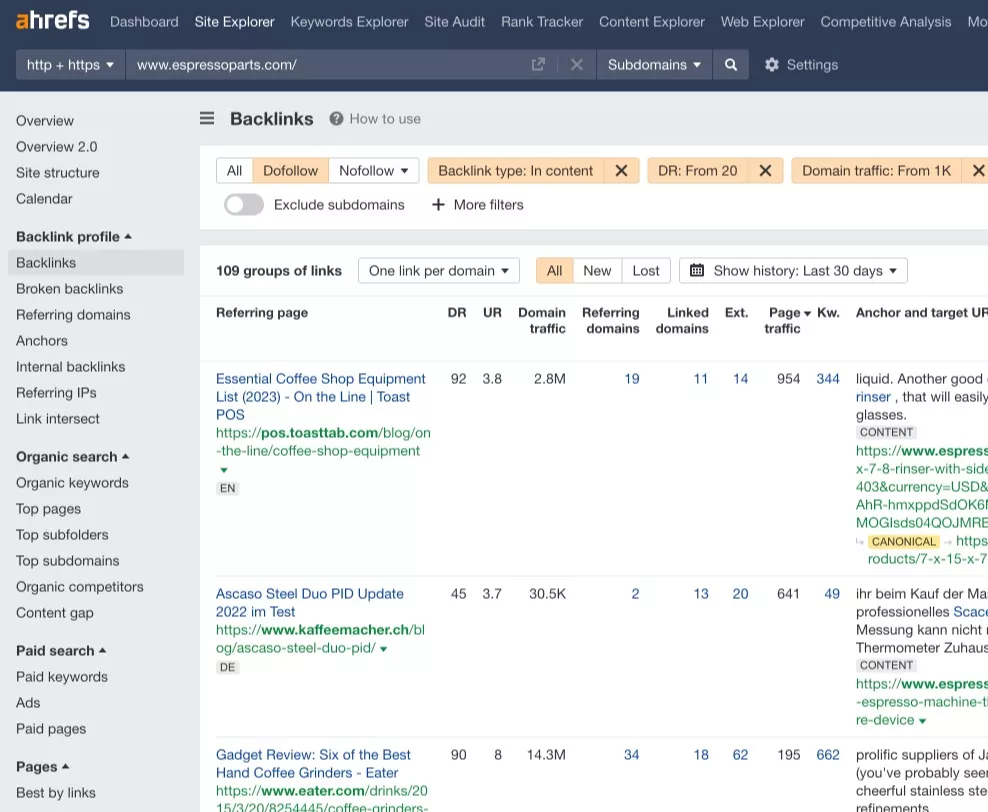
You can scrape these outreach targets by exporting the backlink report directly from Ahrefs.
How to Qualify Link Prospects?
The last result you want to see is getting your website hit by penalties stemming from aggressive link building strategies and being associated with spammy, low-quality sites.
Setting your own criteria to qualify SEO outreach prospects is integral to link prospecting.
Topical Relevance
The basic yet underscore factor of backlink qualification is knowing when a website is topically relevant to your website.
This guide by Glen Dimaandal of SearchWorks shows you the degrees of relevance, and you can incorporate them into your link acquisition campaign.
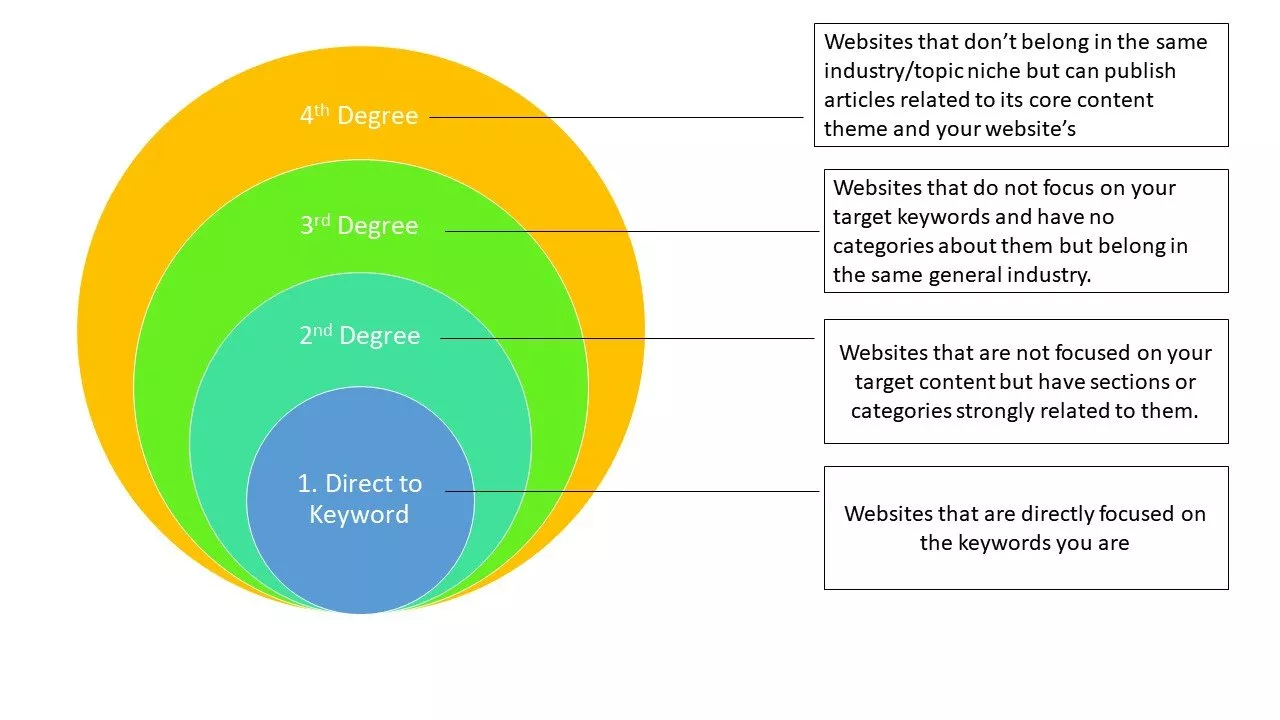
I recommend going after websites directly focused on the keywords you’re trying to rank for. Initially, try to get most of your first degree links before jumping into 2nd, 3rd, or 4th.
For instance, if you’re doing guest posting for a retailer of espresso machines, go for niche websites that especially talk about espresso (first degree) or from coffee websites with espresso or coffee articles (second degree).
As you get limited link prospects, you can find food blogs (third degree) and home and lifestyle blogs with coffee-related articles (fourth degree).
The last thing you want to do is to get high-quality links from completely irrelevant domains. You’ll be investing tons of resources, leading you to nowhere.
Authority and Trust Metrics
Link intelligence tools like Ahrefs and SEMRush give you a quick number of the site’s authority based on these tools’ metrics. With Ahrefs, there are Domain Rating (domain-level) and URL Rating (page-level) metrics to check the site’s authority from a scale of 1 to 100.
The higher the DR of the SEO outreach prospect, the more potent link authority it can pass to your website.
You can use Majestic SEO”s Trust Flow and Spam Score to check the website’s trustworthiness for trust qualifiers. Their trust metric is based on how closely related your site is to their own set of seed-trusted sites. Their team curates and manually reviews these seed-trusted sites for anyone to manipulate their ranking score.
Potential Organic Traffic
In your SEO prospecting, you can come across domains with high Domain Authority (e.g., DR50+) but with less than a thousand organic traffic.
This is a loophole for many SEO professionals not considering the site’s organic traffic.
One main factor you must consider when vetting SEO outreach prospects is the site’s ability to drive referral traffic to your pages through the links you’ll get from them.
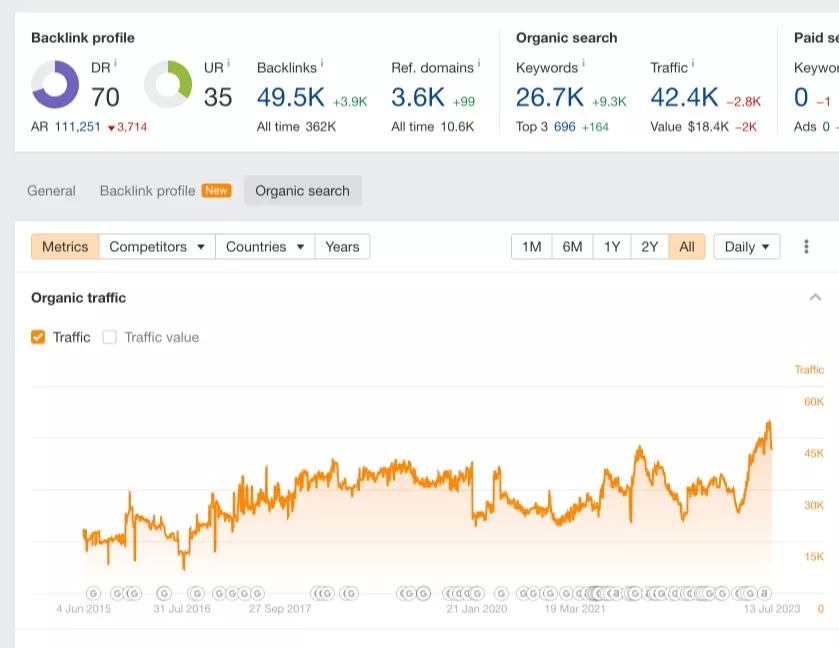
With Ahrefs, you can see how much traffic a specific page gets organically from search engines. Adding this to your metric toolbox can help maximize the value of links you’ll acquire for your site.
Link Obtainability
Can you get a link from the page/website? What types of resources are needed to acquire the link? Is there a need for new content (guest post or destination content hosted on your site)?
Most SEO professionals focus on relevance, authority, and trust-based metrics when checking if the site fits them, but not link obtainability.
Link obtainability is the ability of the website to provide a backlink to your site voluntarily.
For instance, ask yourself if you’re getting a link from your eCommerce store’s “where to buy” page. “Do you have products you’re authorized to sell so you can be included in the manufacturer’s where to buy page?
If you’re writing a guest post for a high DR publisher, do you have writers in your team who have expertise on the subject and can craft high-caliber content?
All these things must be considered before doing your SEO outreach campaign, especially during the outreach stage, where you negotiate or request a link from your link prospect.
SEO Outreach Strategies
Different approaches to acquiring links from your link prospects constitute different link building strategies that fit your website.
Initially, you want to know what link acquisition strategy you can use to get inbound links.
While this list isn’t massive, you’ll find new techniques to capture an audience and get a link without being too aggressive with your SEO outreach campaign. Let’s dive into each SEO outreach strategy.
Choose highly specialized topics when guest blogging.
If you’re unfamiliar with guest blogging, guest blogging refers to writing a new piece of content on other people’s content publishing site that adds value to their readers while having a contextual link to your website.
These days, you’ll see in your inbox “crappy guest posting pitches” with a generic list of topics they have sent to multiple blogs already. Without considering the blog’s traffic, intended audience, and other pertinent success factors to ensure they’ll provide value to your readers.
You may receive one of these email pitches that starts with “I’m a big fan…” or “I’ve read your blog..”, which are awful, inauthentic outreach templates.
Choosing highly specialized topics is one of the best things to stand out in guest blogging.
If you’re targeting a high domain authority website, you’ll find they have a list of topics they want their outside authors to cover when writing a guest post. This means they have strict guidelines for the editorial piece regarding word count, content theme, and links you can only use as references.
All these correspond well whether or not you’ll have the opportunity to land a guest post on their blogs.
By choosing highly specialized topics, you’re writing about topics they don’t normally publish on their blogs, as they haven’t incurred enough expertise on the subject. Thus, most of their topics only cover ones they know about.
By being different with your chosen topics, your SEO outreach campaign stands out, leading to a more positive response and, eventually, a guest post you wish to have.
For instance, in the SEO space, most digital marketing agencies and bloggers pitch topics about link building and content marketing. However, only sometimes do you see guest posts on analytics and UX.
By going after these highly specialized topics that require extensive experience to develop actionable content that provides value to readers, you stand the chance of being a few of the authors these high authority sites accept in your industry.
Reverse SEO outreach
Reverse SEO outreach is building content assets that other content publishers want to get links from (not only building links to).
Instead of requesting linkers for backlinks to your content, you let them come to you and ask if they can be included in your content.
How’s that possible?
You use link roundups to get outreach emails from brands wanting to be included in your post. Brands want to be on your “list posts” where there’s likely an opportunity to get referral links and sales through clicks.

So, instead of using link roundup as a value proposition to approve link requests from other content publishers, you use it to bait brands and content creators to send you outreach emails. This way, you got more leverage than when you reach out to these people for link requests.
The best way to initiate this is to come up with a solid idea of what entities, brands, and content publishers you want to curate that are relevant to your site and has the potential to attract outreach emails after it ranked for their keyword.
Establish Thought Leadership in Outreach Emails
The missing values in most SEO outreach emails are authenticity and credibility. When people see you as an authentic person, writer, or expert, you increase the trustworthiness of your email.
One way to increase response and link placement rates in your SEO outreach emails is to position yourself as an authority in your industry.
Include a corporate signature if you’re sending from a digital agency or in-house SEO team.
Mention authority sites you’ve written for, especially ones that have been top-of-mind in your space. Entities you’ve been associated with that can be useful as social proof to be perceived as a thought leader.
You may also choose topics their site is missing to write about that can help increase their site’s organic traffic via ranking. Use Ahrefs to plug in the domain and see what topics could be useful for the site to bring additional organic traffic. Tap into Ahrefs’ Content Gap Analysis and see what their competitors are currently ranking that your content publisher isn’t yet.
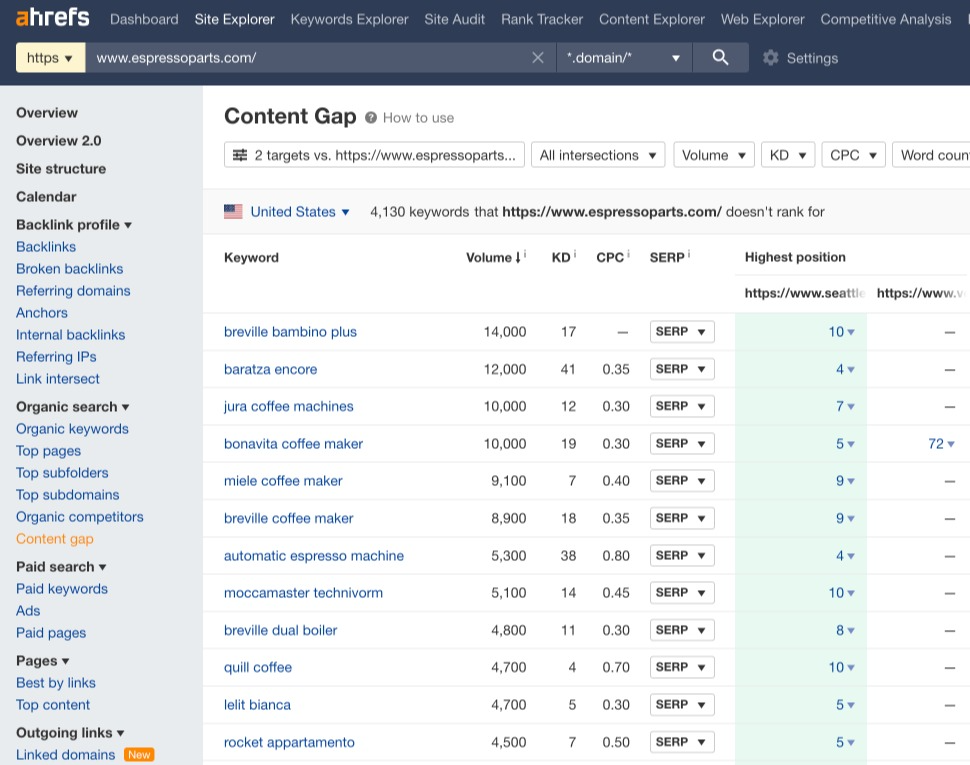
Relationship Building
Sustainable link acquisition requires building stronger relationships with other content creators.
By focusing on a few yet highly valued content publishing sites, you leverage resources, which include creating new regular content pieces – allowing for a steady number of links for your site.
Build relationships with active guest bloggers in your industry. You can use Ahrefs’ Content Explorer to find these authors quickly.
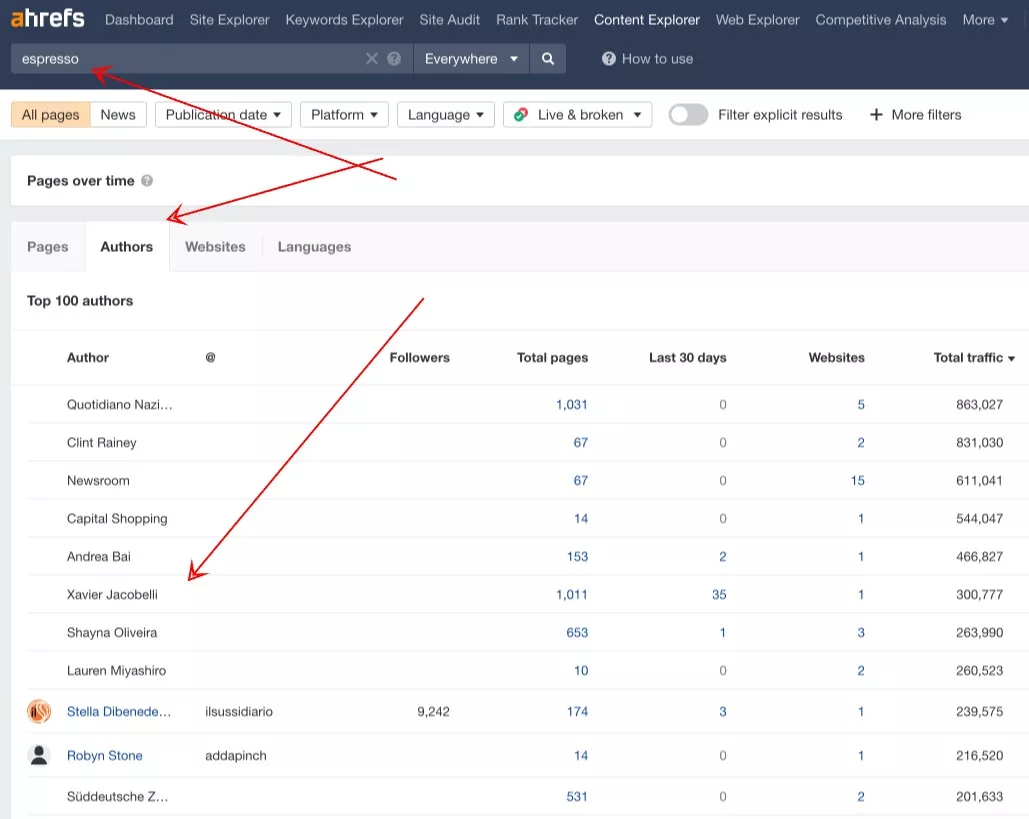
Check their website to see if they write guest posts for their clients or their own websites.
Reach out to them and offer links to your future guest posts, pointing to one of their articles. And in return, ask if they can also provide links to your site from their future guest posts.
Peer Review
I got This SEO outreach strategy from Jason Acidre’s talk on advanced link building.
This link building strategy aims to get niche experts to review your content asset, ask for feedback, and improve it based on their recommendations.
By doing so, you improve the quality of content by allowing thought leaders in your space to add more points, include some data, or have them review your content.

You can include them as peer reviewers at the bottom of your article to increase the trustworthiness of your content asset (which is a big factor in today’s Google E-E-A-T).
A peer review strategy is also a way to initiate connections with thought leaders you want to associate with your brand without being aggressive or using traditional techniques, such as interview requests.
Semi-Personalization at the Initial Outreach Stage
The SEO outreach campaign is tedious work. Most link builders give up after their first few attempts.
One of the hurdles in link acquisition is the scalability issues, as it would consume hours to send individual personalized emails to your link prospects.
In our link building agency, we send semi-personalized emails at the initial outreach stage. This saves hours from highly personalizing emails when some of which may not incur responses.
Include the name of your contact person, a quick overview of your content, or your offer. Then once there’s a positive response, you can write a lengthier email about your offer/content details.
By doing so, you scale your SEO outreach campaign by focusing on link prospects that are obtainable for link requests.
Use Creative Approaches in SEO Outreach
Test new SEO outreach strategies for fresh new links and double down on these efforts when there are tangible results.
The key is to keep traditional SEO outreach strategies from boring you. Look at other industries, see what they’re actively doing, and have gotten positive results with it. Replicate their effective strategies and make them worthwhile for your context.
SEO Outreach FAQs:
What is SEO outreach?
SEO outreach is a strategic approach to building high-quality backlinks through research, valuable content creation, and effective management. Businesses can enhance their online visibility and improve search engine rankings by identifying and placing relevant links on external websites. A well-defined process for selecting and monitoring link performance is crucial for successful SEO outreach.
What does an SEO outreach specialist do?
An SEO Outreach Specialist researches link building opportunities on quality websites manually and with SEO tools. They conduct outreach campaigns, monitor progress, and build relationships with partners, webmasters, and influencers.
What are the outreach techniques for SEO?
To enhance your SEO outreach, produce high-quality content, and generate interest. Identify key influencers in your industry and engage them. Participate in online communities and leverage social media to promote your content. Keep an eye on your competitors and use tools for link prospecting. Contact journalists and bloggers for additional exposure.
What is an SEO outreach manager?
An SEO outreach manager is responsible for identifying and securing client link-building opportunities. Their main task is to convert brand mentions into links, which helps improve the client’s website visibility and search engine rankings.
The Author
Venchito Tampon Jr
Venchito Tampon is a Filipino Motivational Speaker, Corporate Trainer, and a Leadership Speaker in the Philippines. He is the CEO and Co-Founder of SharpRocket, a link building agency. With a decade of experience, Venchito has a proven track record of leading hundreds of successful SEO (link builidng) campaigns across competitive industries like finance, B2B, legal, and SaaS. His expert advice as a link building expert has been featured in renowned publications such as Semrush, Ahrefs, Huffington Post and Forbes. He is also an international SEO spoken and has delivered talks in SEO Zraz, Asia Pacific Affiliate Summit in Singapore, and Search Marketing Summit in Sydney, Australia. Check out his other businesses, Hills & Valleys Cafe, Blend N Sips and Saas Pursuit.
How our LINK BUILDING AGENCY builds 250 links/mo consistently using Predictable Link Building Methodology™…
- Using a SIMPLE and PROVEN system
- Using a SCALABLE strategy
- No private blog networks
- No creepy outreach emails
